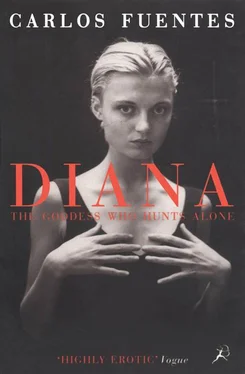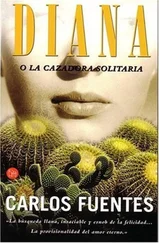Carlos Fuentes - Diana the Goddess Who Hunts Alone
Здесь есть возможность читать онлайн «Carlos Fuentes - Diana the Goddess Who Hunts Alone» весь текст электронной книги совершенно бесплатно (целиком полную версию без сокращений). В некоторых случаях можно слушать аудио, скачать через торрент в формате fb2 и присутствует краткое содержание. Год выпуска: 2012, Издательство: Bloomsbury UK, Жанр: Современная проза, на английском языке. Описание произведения, (предисловие) а так же отзывы посетителей доступны на портале библиотеки ЛибКат.
- Название:Diana the Goddess Who Hunts Alone
- Автор:
- Издательство:Bloomsbury UK
- Жанр:
- Год:2012
- ISBN:нет данных
- Рейтинг книги:3 / 5. Голосов: 1
-
Избранное:Добавить в избранное
- Отзывы:
-
Ваша оценка:
- 60
- 1
- 2
- 3
- 4
- 5
Diana the Goddess Who Hunts Alone: краткое содержание, описание и аннотация
Предлагаем к чтению аннотацию, описание, краткое содержание или предисловие (зависит от того, что написал сам автор книги «Diana the Goddess Who Hunts Alone»). Если вы не нашли необходимую информацию о книге — напишите в комментариях, мы постараемся отыскать её.
Diana the Goddess Who Hunts Alone — читать онлайн бесплатно полную книгу (весь текст) целиком
Ниже представлен текст книги, разбитый по страницам. Система сохранения места последней прочитанной страницы, позволяет с удобством читать онлайн бесплатно книгу «Diana the Goddess Who Hunts Alone», без необходимости каждый раз заново искать на чём Вы остановились. Поставьте закладку, и сможете в любой момент перейти на страницу, на которой закончили чтение.
Интервал:
Закладка:
I began to be haunted by the idea that Diana was a work of art that had to be destroyed to be possessed. In sex, as in art, interrupted pleasure is a poison, but it also stimulates an ambiguity that is the amniotic fluid of both passion and art. Could I come out of this ecstasy at the cost of destroying Diana, the object that caused it? Should I, in other words, anticipate her? Should I ensure the possibility of continued pleasure in its unique atmosphere of ambiguity, of might-have-been or might-have-not-been, nothing resolved, everything in the marvelous realm of the possible, where alternatives, for a story or for a passion, multiply and open like a fan that compromises but enriches our freedom?
I landed in Santiago at five in the afternoon, still unable to answer my own questions.
The ride from the airport to Diana’s house seemed especially long this time. The tedium of the town, its stores closing and their metal gates crashing down like deafening waterfalls of steel, was broken only by the swish of the trees and the growing shadow of the mountain, which dominated the city. I saw nervous turkeys and scarred cactus fences covered with the markings of lovers — names (Agapito loves Cordelia), linked hearts — mortal wounds that left dark scars on the green flesh.
“What’s going on?” I asked the cabdriver. “Why are we going so slowly?”
“It’s a demonstration. Another student protest. Why don’t they spend their time studying? Bunch of lazy bastards.”
The town square smelled of mustard. A vague, depressing cloud covered it. People ran for the side streets, coughing, covering their noses with handkerchiefs, sweaters, newspapers. I imagined the governor barking behind a window. I saw the young leader Carlos Ortiz run by, blood pouring down his face.
“Close your window, señor, and hold on.”
He made a U-turn and escaped toward the neighborhood where my temporary home, my papers, and my books were. I felt the landscape of Santiago falling to pieces, its inhabitants rapidly losing their features …
XXIX
The expression on Azucena’s face told me something was up. She never showed anything, and I knew nothing of her emotions. Sometimes we chatted, very cordially, as I’ve said. We were linked by language — lines of poetry we all learned in Spanish-language schools: “Yesterday’s gone. Tomorrow hasn’t arrived.”
I respected her, as I’ve also said, for her dignity, her pride in doing well what it had fallen to her to do well in this world. In the little world of Hollywood transplanted to Santiago, she was the only one, in the end, who was neither sorry for herself nor devoured by a desire to rise in the world. She was superior to her mistress. She didn’t want to be someone else. She was someone else. She was herself.
Now she received me in a dimly lit, strangely silent house. She had an unaccustomed grimace on her face, and it took me a while to find in it any sympathy, any affection, any solidarity with the other Hispanic person present. For a moment I felt perfectly melodramatic, like the poet Rodolfo asking his Bohemian companions why they’re walking around so silent, why they’re weeping. Mimí is dead. Azucena was holding back, unintentionally of course, something like a death announcement.
“Diana?” I asked, as I might have asked out loud, except that now I said her name almost in a whisper, as if I were afraid of interrupting a novena to the Virgin.
“Wait here. She’s on her way,” said Azucena, inviting me to stay in the living room.
Night was falling. Lew Cooper wasn’t there as he usually was, standing at the liquor cabinet mixing a cocktail justified by the hard work involved in exterior shots. The bedroom door was closed. But my clothes were there and, in the bathroom, my Italian toothpaste. Impatiently, angry, I walked to the corner where my typewriter, my papers, and my books were laid out. Someone had imposed order on everything. Everything was arranged in perfectly symmetrical piles.
I went back to find Azucena, to protest this violation of my creativity. Instead, I found Diana, divided by the light of the gallery at nightfall, half light, half shadow, perfectly cut in two, like one of Ingres’s female portraits, my beloved Diana Soren. She walked toward me, separated from herself by the light, yielding not an inch of her luminous person to her dark person, or vice versa. The contrast was such that even her short blond hair seemed white on the side of the gallery window and black on the wall side. The charm was broken by her outfit. In a pink quilted robe buttoned to her throat, totally domestic, and a pair of fluffy slippers, Diana Soren looked like an upside-down mushroom, a walking thumbtack …
It wasn’t that — not the magic of her appearing between light and shadow, not how absurd I instinctively judged her appearance to be — which kept me from walking over to her, embracing her, and kissing her as I’d always done. She never reached me. She stopped and sat down in a rattan chair, the most imperial object in this house devoid of pretensions, and she stared at me intently. I sat down in the thatch-backed chair opposite my desk and crossed my arms over my chest. Perhaps Diana had read my mind. Perhaps she imagined, as I did, how our love would end and what would follow it. It occurred to me to tell her, before saying anything else, how useless my trip to Mexico City had been. I found out nothing about the FBI threat General Cedillo had hinted at. I was going to tell her, but she spoke first, quickly, brutally.
“Forgive me. I have another lover.”
I controlled my confusion, my rage, my curiosity …
“In the U.S.?” I asked without daring to mention my telephone indiscretions.
“Another man is living here.”
“Who?” I asked, not daring now to think about The Return of Clint Eastwood and telling myself that at least they wouldn’t allow a Black Panther to cross the border. The stuntman? I laughed at myself for even thinking it. I laughed even more at the ludicrous possibility of old Lew Cooper’s sleeping in my bed, next to Diana.
“Carlos Ortiz.”
“Carlos Ortiz?”
“The student. You saw him here in Santiago. He says that he knows you and admires you and that he’s spoken with you.”
“Suppose he hated me and refused to speak with me.” I tried to smile.
“Excuse me?”
“This isn’t about excuses. It’s about talking things over.”
“I don’t like explaining myself.”
I stood up, enraged. “I just mean talking.”
“We can talk if you like.”
“Why, Diana? I thought we were very happy.”
“We also knew it would end.”
“But not like this, suddenly, prematurely, before the filming was over, and with a boy—”
“Younger than I am?”
“No, that doesn’t matter.”
“Well, what does? The fact that I hurt you, humiliated you — do you think I like doing that?”
“Not having carried our love to its end, not having used it up completely, that—”
“I don’t think there’s anything left.”
“Diana, I offered you everything I could — to go on being together if that’s what you wanted, to go together to some university,” I said stupidly, confused by a sudden vague feeling of sentimental blindness.
She was right to answer me like this, brutally, without sentiment. “Don’t be naïve. Do you really think I’d waste my life in some shitty hick town covered with ivy but made of nothing? You must be crazy.”
“Why crazy? You’ve been running away from another hick town, and you never want to give yourself the opportunity, the chance to go home and then leave again, be renewed.”
“Darling, you’re delirious. I felt suffocated in that town. I would have left there no matter what.”
Читать дальшеИнтервал:
Закладка:
Похожие книги на «Diana the Goddess Who Hunts Alone»
Представляем Вашему вниманию похожие книги на «Diana the Goddess Who Hunts Alone» списком для выбора. Мы отобрали схожую по названию и смыслу литературу в надежде предоставить читателям больше вариантов отыскать новые, интересные, ещё непрочитанные произведения.
Обсуждение, отзывы о книге «Diana the Goddess Who Hunts Alone» и просто собственные мнения читателей. Оставьте ваши комментарии, напишите, что Вы думаете о произведении, его смысле или главных героях. Укажите что конкретно понравилось, а что нет, и почему Вы так считаете.












